- Home
- Frank Herbert
Frank Herbert Page 3
Frank Herbert Read online
Page 3
Seeing Roger, she whirled once, did a deep curtsey.
Roger threw his papers and the play onto a couch, leaped into the center of the room. As Pepina picked up her cue, they executed a pas de deux to the closing strains of the music. The record ended. Roger completed the steps of the dance in such a fashion as to bend over the record player, lift the needle, and shut off the machine all in one fluid motion.
“I perish of hunger,” he said, collapsing onto the couch. “Give me your lips and then sweetbreads, perhaps.”
Pepina rose to her tiptoes, bent low over Roger, and brushed his lips with hers. Pulling back, she said, “Fish, m’love.”
“Fish!” Roger made a face, slid farther down on the couch. “You caught it yourself?”
“At Mulganey’s Market,” Pepina said.
Roger’s outstretched hand touched the manuscript of Mrs. Gruntey’s play. He picked it up and leafed through it.
“Don’t try to change the subject. We both know there never has been and never will be a person named Mulganey. That is the name of a stew which is fed to starving peasants.”
Pepina folded her arms on her breast, lowered her head, said, “My lord knows best.”
Without warning she leaped at him, landed in his lap, knocking the copy of the play behind the couch. Their mood dissolved in laughter.
“Was that Mrs. Gruntey’s play you were reading?” Pepina rested her head in the curve of Roger’s neck.
Roger pushed her away, shuddered.
“Don’t mention it before I’ve eaten. It’s hideous. That woman has more money than brains. Unfortunately, her money and the deficiency in the gymnasium building fund appear to have come to some blinding focus in Coleman’s pinhead.”
Pepina blinked her eyes at him. “You’re just tired and hungry.”
“And I have to produce the abominable thing.”
“The deficiency?” Pepina asked.
“Cease, woman; I shall bite you. President Coleman’s command performance must go on!”
Pepina’s voice took on a pensive tone. “You know, Roger, I’ve read the play and …”
“Food!” Roger pushed her off his lap onto the floor. “Come, naiad! Produce the finny brothers you have bewitched from the depths.”
“Mulganey’s,” Pepina said. She stood up.
O O O
After dinner, Roger put on swimming trunks, took a swim in the river from the front porch, and returned to the living room. He sat down, making a damp spot on the straw carpet, and wrapped a towel around his shoulders.
Pepina was on the couch with the play in her hands. Tears of laughter rolled down her cheeks. When she could control herself, she turned to Roger.
“Darling, I’m just reading over some of this thing. This is the most wonderful farce since Uncle Tom’s Cabin.”
“Uncle Tom’s Cabin wasn’t a farce; it was a serious play.”
Pepina nodded, a blonde curl falling across her forehead. She puffed out her lower lip and blew it back. “I know. But sometimes seriousness is the most farcical thing in the world, and you must admit Uncle Tom is now a delightful farce.”
Roger ran a hand through his wet hair and shook the water at Pepina.
“Stop that!” she said.
“If we lampooned that play, the Lady Gruntey would dissolve in the smoke from a burning deficiency.” Roger stretched out on the carpet. “Besides, I’m too lazy.”
“What’re you going to do?” Pepina asked.
“Produce the play. All the time I shall be quaking in my slippers that some egghead doesn’t convey your little joke to her. Pah!”
“Ro-ger …” Pepina’s voice drew out the name with an ominous tone.
Roger ignored her. “After I have produced this disaster, I shall drink a glass of Chablis and walk quietly off the end of the dock.”
“Reciting Shakespeare in a hoarse whisper,” Pepina said. “Besides, you couldn’t walk quietly off the end of the dock. You’d splash.” She leaned toward Roger. “Dear Heart, have you thought of the fact that if you produce this play at all, it’ll get nothing but guffaws? It’s a caricature of life.”
“Mrs. Gruntey is a caricature of life,” Roger said. “You remember her. You saw her at last year’s faculty tea.” He sat upright in a graceful arc. “She speaks of vibrations, and most appropriately. Her whole front vibrates like two bowls of jelly.” Again he reclined on the floor.
Pepina slid off the couch, stretched out beside him.
“You’ll get wet,” Roger said.
“Mmmmmmm,” Pepina nibbled at his ear. “Does my own Machiavelli wish a word of advice?” She slid a hand along his cheek and jaw line.
“What?”
“When the audience laughs, watch your authoress and join her. She may want credit for having produced a hit … intentionally.”
Roger jerked to a sitting position. “That thing? A hit?”
He leaned across Pepina and retrieved the play from the couch. “This needs another look.”
O O O
The casting of Rhythm of Life began the following Friday in an English Department classroom. A temporary stage was created at the end of the room by stretching a length of clothesline across at the level of the window tops and hanging drop cloths at each end.
Roger, Pepina and Mrs. Gruntey—each with a copy of the play—sat in three adjoining chairs about ten feet from the improvised stage. The room lights were turned off. A spotlight set on a table illuminated a junior coed reading Melissa’s part.
Mrs. Gruntey leaned her wide bosom across Pepina toward Roger. “She doesn’t have the correct rhythms for the part.”
“I’m inclined to agree with you,” Roger said. “She’s too skinny. No chest.”
“That dark girl over in the corner,” Mrs. Gruntey said. “I like her emanations.”
Roger’s gaze followed her direction. “Yes, she does have excellent … uh, emanations. She was a supporting player in last year’s play. Not quite so nubile then.” Roger stood up. “Okay. Okay.” He waved the girl into the wings. He turned to the girl in the corner. “Shirley. Take it from where she says, ‘Mother, daaaarling.’ Skip the stage directions. Just read the part.”
The dark girl walked to the stage, taking a copy of the play from the wings.
“Well-developed wench,” Pepina said.
“Good emanations,” Roger said.
The dark girl began reading in a husky contralto.
Mrs. Gruntey leaned toward the stage. “Excellent! Oh, perfect!”
Roger whispered out of the corner of his mouth to Pepina: “Our methods of selection are different, but we are in surprising accord.” He turned to the girl on the stage. “That’s it, Shirley. Start learning the part.” Turning back to Pepina, he said, “Now we’ll pick Leopold. I like Carl Boler, that tall fellow who was talking to Shirley. Remember him from Macbeth?” Roger lowered his voice. “Let’s hope his rhythms are right.”
To the tall, blond student leaning against a wall by a side window, Roger said: “Carl, turn to page nine. Take Leopold from where he says, ‘Suppose the brat is mine?’”
Mrs. Gruntey turned to Roger, a look of exaltation on her face. “He doesn’t have to say a word. I could have chosen him for the part from a crowd of ten thousand. His emanations are positively indecent.”
Pepina leaned close to Roger’s ear. “Your authoress has an observing eye. Carl must be in a rut.”
Carl began reading the part, walking forward of the curtain line.
Mrs. Gruntey again leaned across to Roger. “I know just the costuming he needs,” she whispered. “Black tights and a frock coat. A gold chain around his neck to signify that he’s rich, and right in the middle of his chest, hanging from the chain, a big gold starburst. I have just the thing on an evening gown.”
“A sort of stallion medallion,” Roger said. “Good idea.”
Pepina giggled.
“For the girl—a red, floor-length gown,” Mrs. Gruntey persisted. “And over the bosom,
two hands painted on the gown the color of ashes. At the bottom of the gown a rough edge of gray to signify more ashes. A soul burning …”
Again Pepina whispered in Roger’s ear: “Mrs. G. is past her prime, but she has advanced ideas. Me, I’m beginning to think you’ve misjudged her. I like her.”
“Going over to the enemy,” Roger whispered.
“I’ll see my dressmaker tomorrow,” Mrs. Gruntey said. “I believe I have a red gown that could be made over to fit that girl.”
“I hope her feelings won’t be hurt when they laugh at her play,” Pepina whispered. “Invite her down to the houseboat when this is over. I wish to know more of the Lady Gruntey.”
O O O
It was past ten o’clock when the chosen cast of Rhythm of Life, accompanied by the authoress and Roger and Pepina, descended the steps to the houseboat. At the top of the steps, Mrs. Gruntey’s Cadillac and Chinese chauffeur waited in a darkness broken only by a single unshaded streetlight on a telephone pole. Two more unshaded lights strung on thin uprights illuminated the steps.
Mrs. Gruntey held carefully to the handrail as she descended.
“You live in one of those lovely houseboats,” she said. “I’ve seen them so often … from the bridge. So Bohemian looking.”
The bottom step creaked in protest as she eased her weight onto it.
At the houseboat, Pepina switched on the lights, swung open the door, stood aside. Mrs. Gruntey stopped in the doorway, halting the procession behind her.
“Just as I had imagined it,” she murmured. “Oh, you people don’t know how lucky you are. Young … married to someone you love …”
In the background, a member of the cast giggled.
“Married yet!”
Roger drew in a breath sharply, glanced at Pepina. She leaned over and kissed him on the cheek.
“Courage,” Pepina whispered.
Mrs. Gruntey moved forward into the houseboat. The others followed.
“Where’s some chow?” someone asked. “Pepina, make some sandwiches. We brought the beer.”
Roger pulled back a corner of the straw carpet and lifted a trapdoor, which exposed a screened box sunken in the river. “Put the beer in here. There’s some down there already cold. We can drink that.”
In a corner of the room, a girl put a record on the player. The music of Ravel’s “Sacred and Profane Dances” filled the room.
From the kitchen, Pepina shouted, “Turn that thing down. It would wake the dead.”
“They should be awake,” Roger said. “This is their hour.”
Mrs. Gruntey had carefully seated herself on the brilliant orange couch. She looked from one person to another, smiling.
Suddenly, she turned to Roger. “I’ve never really lived before. I know you …”
The front door of the houseboat burst open. Three of the four independent college students who occupied the next houseboat walked in. They wore bathrobes, slippers, and swimming trunks.
“Sounds like a party,” the one in the lead said. “Where’s the beer?”
An opened bottle of beer was thrust into his hand. He took a deep drink, wandered over, and sat down beside Mrs. Gruntey.
Mrs. Gruntey beamed upon him. “This is a celebration. We’ve just completed casting my play.”
“You wrote a play?” the student asked. “What’s it about?”
“The vibrations of life,” Mrs. Gruntey said.
The student looked at her out of the corners of his eyes. “You kidding me?”
Roger had seated himself on the floor beside the couch. He leaned across to Mrs. Gruntey. “It’s bad luck to talk about a play to outsiders before it’s had its first rehearsal.” He turned to the student. “Clam up, weasel!”
Pepina entered with a platter of sandwiches, dodged two students dancing past the kitchen doorway, and in a graceful sweeping motion, put the plate on the floor in the middle of the room.
Roger stretched out on the floor, took two sandwiches from the plate, and handed one to Mrs. Gruntey. Carl, an expression of disdain on his narrow face, came from the corner where he had been talking to two coeds. He sat down beside the trapdoor and began lifting bottles of beer from the box, opening them with an opener tied to a string on the trapdoor. The student beside Mrs. Gruntey took one of the bottles, handed it to her. He clinked bottles with her, spilling foam on her bosom.
“Here’s to the success of your vibrations.”
“Oh, I know it will be,” Mrs. Gruntey said. She tipped up the bottle and drained it in a single swallow.
Roger’s eyes bulged. He watched the beer pour down Mrs. Gruntey’s throat. Mrs. Gruntey blinked her eyes, held the bottle away from her, and stared at the label, pursing her lips. “Oh, you shouldn’t be drinking this,” she said. She turned toward the young people in the center of the room. “Would one of you lovely children run up to the top of the steps and tell my chauffeur to get a case of beer from my cellar and bring it down to us?”
One of the students in bathrobe and swimming trunks stood up. “I’ll go.” He ran out the door.
Mrs. Gruntey turned to Roger. “I like American beer,” she said. “Amos had his beer imported from Munich like yours there. But I can’t stomach German beer. I was raised in the Midwest. Amos was my husband, God rest him. May I have another sandwich?”
“We learned to drink German beer in Switzerland,” Roger said. He found another sandwich, handed it to Mrs. Gruntey. He stood up, excused himself, and went into the kitchen, where Pepina was making more sandwiches and talking to Shirley. The dark girl had a knife in her tanned hand and was slicing French bread.
“This is terrible,” Roger said. “She’s turning out to be a human being. And I sneered at her. I feel like the lowest heel of creation.”
“Darling, you’re drunk,” Pepina said.
“Swacked,” Shirley said. “Excuse me while I get some more bread.”
“No.” Roger shook his head. “I’ve had only one beer.” He frowned in concern. “I think I should tell her about her play.”
Pepina whirled on him. “And destroy her happiness? I wouldn’t let you.”
“But …”
“No!” Pepina stamped her foot.
Roger shook his head from side to side. “There’s another thing. She’s drinking beer. What if she asks to go to the bathroom?”
“Well…?”
“Your murals.”
Pepina grinned at him. “So they’re reminiscent of the walls of Pompeii. There are people in this town we don’t even know who have bragged about using that bathroom!”
“The test of fame,” Roger said. “But she’s bound to have some kind of a bad reaction. She couldn’t be a pal of old Cold-man’s without being an anti-vicer.”
“Roger, will you stop figuring out things to worry about? You’re beginning to make me nervous.”
Roger shrugged his shoulders. “One lives; one must expect problems, eh?”
“That’s the spirit,” Pepina said. “Now go back in there and entertain our guest.”
Roger walked back into the living room. The record player blared Boris Godunov. Alexander Kipnis’ baritone voice filled the room.
Mrs. Gruntey raised herself from the couch, avoided a dancing couple, and walked over to Roger.
“Pardon me, Mr. Corot,” she said. “Where is your washroom?”
Roger stiffened.
A student near the kitchen door heard Mrs. Gruntey. “Whoops!” he said. “Prepare for christening!”
Roger glared at the speaker.
Mrs. Gruntey took no notice. “Your washroom?”
Roger swiveled slowly to the left, pointed. “Down that hallway. First door on your left.”
“Thank you.”
Mrs. Gruntey entered the shadows of the hall and disappeared from sight, humming “Once Upon a Time in the City of Kazan.”
Without looking down, Roger reached out with his left hand, found the arm of an unoccupied chair, and slumped into it. He put his head in his ha
nds.
“Ohhhhhhh,” he moaned.
It seemed less than a minute before Mrs. Gruntey reappeared. As she emerged from the hallway, a student took a yellow paper lei from a hook beside the door and looped it over her neck.
“Welcome, oh fellow explorer into the depths of Pepina’s washroom,” he said. “You win the lei of success for surviving the ordeal.”
Everyone in the room except Roger laughed. Roger kept his face in his hands. Pepina appeared in the kitchen doorway, remained silent.
Mrs. Gruntey blushed. She turned to Roger, her eyes wide.
“Who did those magnificent murals?”
“Huh?” Roger raised his head.
“Those murals?” Mrs. Gruntey asked.
“Mrs. Gruntey, I …”
Her words penetrated his consciousness. He fell silent.
“I did them,” Pepina said. “They’re copies of a Pompeian frieze.”
Mrs. Gruntey descended to the chair opposite Roger. “They’re so primitive. When Amos and I were on our honeymoon, we visited India. There’s a palace ruin beside the Mogul desert. Perhaps you’ve heard of it—the carvings on its walls … fertility symbols.”
Roger continued to stare at Mrs. Gruntey, his eyes large, his face expressionless.
Pepina sat down on the arm of Roger’s chair. “Oh, I’ve seen them. I visited India with my father. It was the funniest thing. He tried to leave me behind. I was only twelve. I hired my own guide, and he explained everything in great detail. Poor daddy. He was so disturbed when I started asking questions.”
“Well, some people call them indecent,” Mrs. Gruntey said. She smiled at Pepina. “Somehow I couldn’t quite accept that. After all, what is art?”
Pepina nodded.
“I took photographs of the Mogul carvings,” Mrs. Gruntey said. “Perhaps you’d like to see them sometime.” A reminiscent smile touched her lips. “I had to hide the photographs from Amos. He was a little prudish about some things.” Again she looked at Pepina. “But you have such surpassing talent,” she said. “Those …”
She was interrupted by the entrance of the Chinese chauffeur, who was carrying a large box.

 Direct Descent
Direct Descent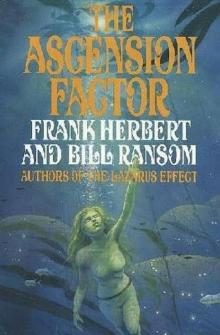 The Ascension Factor
The Ascension Factor The Heaven Makers
The Heaven Makers Children of Dune
Children of Dune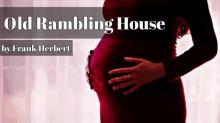 Old Rambling House
Old Rambling House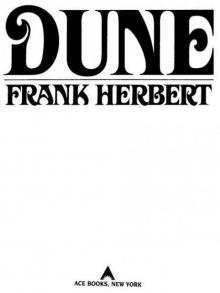 Dune
Dune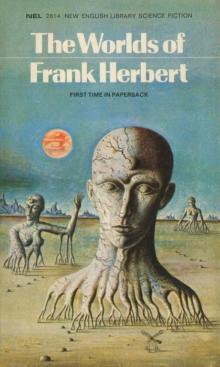 The Worlds of Frank Herbert
The Worlds of Frank Herbert The Jesus Incident
The Jesus Incident Heretics of Dune
Heretics of Dune Whipping Star
Whipping Star Dune Messiah
Dune Messiah Man of Two Worlds
Man of Two Worlds The Book of Frank Herbert
The Book of Frank Herbert Hunters Of Dune
Hunters Of Dune The Tactful Saboteur
The Tactful Saboteur Soul Catcher
Soul Catcher God Emperor of Dune
God Emperor of Dune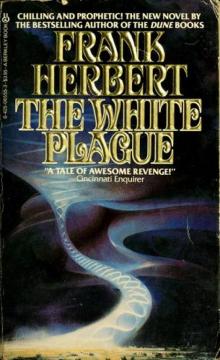 The White Plague
The White Plague The Green Brain
The Green Brain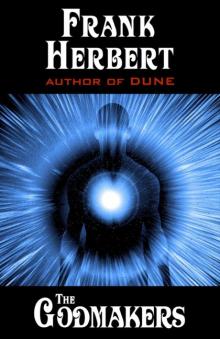 The Godmakers
The Godmakers Sandworms of Dune
Sandworms of Dune Destination Void
Destination Void The Dosadi Experiment
The Dosadi Experiment Eye
Eye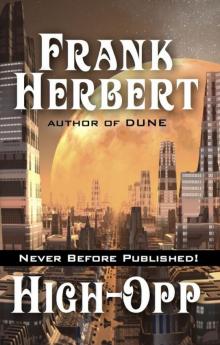 High-Opp
High-Opp The Eyes of Heisenberg
The Eyes of Heisenberg Missing Link
Missing Link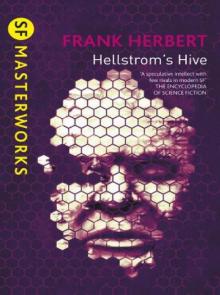 Hellstrom's Hive
Hellstrom's Hive Chapterhouse: Dune
Chapterhouse: Dune The Santaroga Barrier
The Santaroga Barrier The Dragon in the Sea
The Dragon in the Sea Operation Haystack
Operation Haystack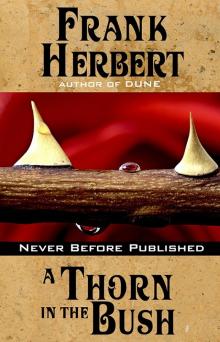 A Thorn in the Bush
A Thorn in the Bush Four Unpublished Novels
Four Unpublished Novels Dune dc-1
Dune dc-1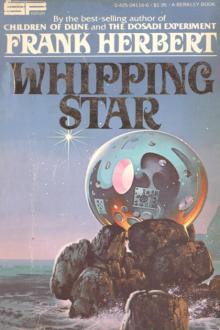 Jorj X. McKie 1 - Whipping Star
Jorj X. McKie 1 - Whipping Star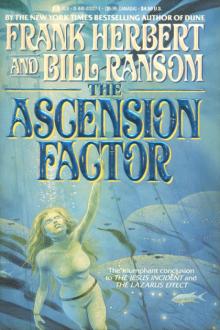 DV 4 - The Ascension Factor
DV 4 - The Ascension Factor Frank Herbert - Dune Book 4 - God Emperor Of Dune
Frank Herbert - Dune Book 4 - God Emperor Of Dune ChapterHouse: Dune dc-6
ChapterHouse: Dune dc-6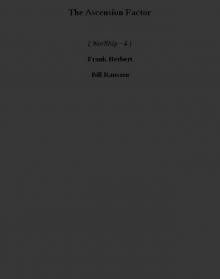 The Ascension Factor w-4
The Ascension Factor w-4 A Game of Authors
A Game of Authors Children of Dune dc-3
Children of Dune dc-3 Destination: Void: Prequel to the Pandora Sequence
Destination: Void: Prequel to the Pandora Sequence The Collected Stories of Frank Herbert
The Collected Stories of Frank Herbert Dune Messiah dc-2
Dune Messiah dc-2 Frank Herbert - Dune Book 5 - Heretics of Dune
Frank Herbert - Dune Book 5 - Heretics of Dune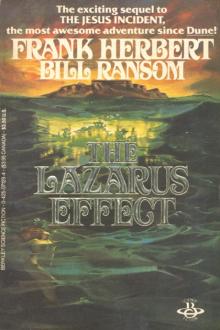 DV 3 - The Lazarus Effect
DV 3 - The Lazarus Effect The Jesus Incident w-2
The Jesus Incident w-2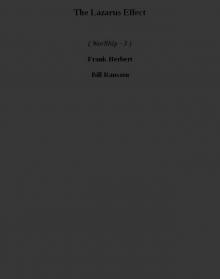 The Lazarus Effect w-3
The Lazarus Effect w-3 Frank Herbert
Frank Herbert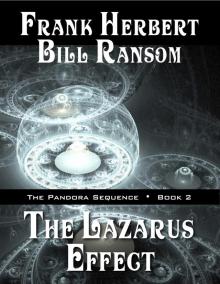 The Ascension Factor: Pandora Sequence
The Ascension Factor: Pandora Sequence Dune (40th Anniversary Edition)
Dune (40th Anniversary Edition) The Dosadi Experiment c-2
The Dosadi Experiment c-2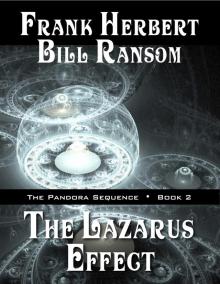 The Lazarus Effect
The Lazarus Effect God Emperor of Dune dc-4
God Emperor of Dune dc-4 The Pandora Sequence: The Jesus Incident, the Lazarus Effect, the Ascension Factor
The Pandora Sequence: The Jesus Incident, the Lazarus Effect, the Ascension Factor The Green Brain (v4.0)
The Green Brain (v4.0) The Heaven Makers (v4.0)
The Heaven Makers (v4.0) Heretics of Dune dc-5
Heretics of Dune dc-5